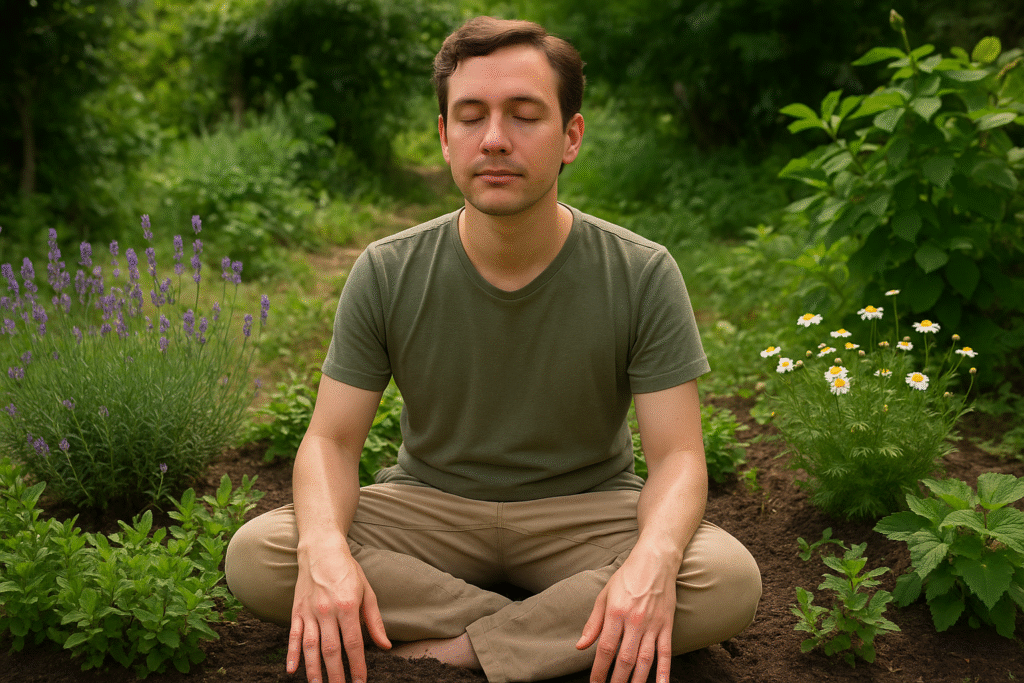Gardening transcends the simple act of growing plants—it represents a profound therapeutic intervention that has captured the attention of mental health professionals, researchers, and wellness advocates worldwide. In our increasingly digital and disconnected society, the ancient practice of cultivating soil and nurturing plant life offers a powerful antidote to stress, anxiety, and depression. Recent scientific studies have illuminated the remarkable psychological benefits, including the mental health benefits of gardening, that emerge when we engage our hands in the earth and our minds in the rhythmic cycles of growth and renewal.
The therapeutic potential of gardening extends far beyond the satisfaction of harvesting fresh vegetables or admiring beautiful flowers. Neuroscientific research has revealed that gardening activities trigger the release of serotonin and dopamine, the brain’s natural mood-elevating chemicals, while simultaneously reducing cortisol levels associated with chronic stress. This biochemical response, combined with the mindfulness inherent in gardening tasks, creates a unique form of moving meditation that promotes emotional regulation and psychological resilience.
Mental health professionals increasingly recognize gardening as a legitimate therapeutic modality, with horticultural therapy programs now integrated into treatment protocols for depression, anxiety, PTSD, and various cognitive disorders. The practice offers a non-pharmaceutical approach to mental wellness that empowers individuals to take an active role in their healing journey while connecting them to the natural world that has sustained human wellbeing for millennia, highlighting the mental health benefits of gardening.
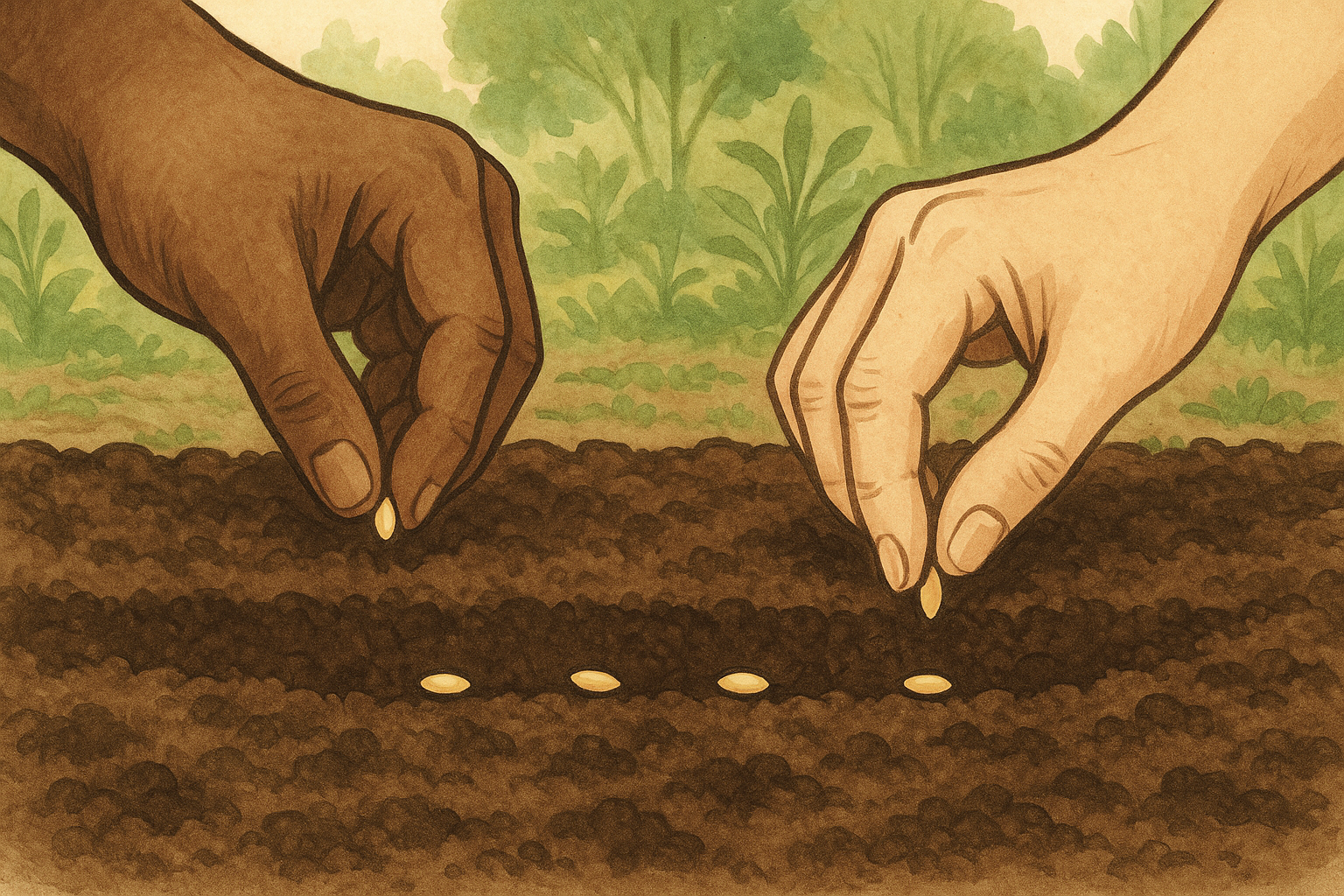
Engaging in therapeutic gardening activities provides structured opportunities for healing and personal growth through nature connection.
Understanding the Neurobiological Foundation of Garden Therapy
The relationship between gardening and mental health operates on multiple neurobiological levels, creating a complex web of positive psychological effects that researchers are only beginning to fully understand. When we engage in gardening activities, our brains undergo measurable changes that promote emotional stability and cognitive function. The tactile experience of working with soil activates the parasympathetic nervous system, triggering the body’s relaxation response and counteracting the chronic activation of stress hormones that characterizes modern life.
By engaging in gardening, individuals can unlock numerous mental health benefits of gardening, encompassing emotional healing and stress relief through active participation in nurturing living plants.
Exposure to beneficial soil bacteria, particularly Mycobacterium vaccae, has been shown to stimulate the production of serotonin in ways similar to antidepressant medications, but without the side effects. This natural mood enhancement occurs through direct skin contact with soil, making gardening a form of environmental medicine that delivers therapeutic benefits through simple, everyday activities. The rhythmic, repetitive motions involved in planting, weeding, and harvesting create a meditative state that allows the mind to process emotions and experiences in a healthy, constructive manner.
The visual stimulation provided by gardens also plays a crucial role in mental health benefits. The color green, predominant in most garden settings, has been scientifically proven to reduce eye strain and promote feelings of calm and restoration. This phenomenon, known as the “green effect,” helps explain why even brief exposure to garden environments can significantly improve mood and reduce symptoms of mental fatigue.
1. Stress Reduction and Cortisol Regulation
Gardening serves as one of nature’s most effective stress-reduction mechanisms, offering measurable physiological benefits that extend far beyond temporary relaxation. Research conducted by the University of Westminster found that participants who engaged in gardening activities for just 30 minutes experienced a significant decrease in cortisol levels, with effects lasting several hours after the activity concluded. This stress hormone reduction is particularly important in our modern context, where chronic stress contributes to a wide range of physical and mental health problems.
The stress-reducing effects of gardening operate through multiple pathways. The physical activity involved in garden work promotes the release of endorphins, the body’s natural stress-fighting chemicals, while the focused attention required for planting and tending creates a natural break from rumination and worry. The predictable, controllable nature of garden tasks provides a sense of agency and accomplishment that directly counters feelings of helplessness often associated with chronic stress.

Regular gardening activities provide natural stress relief through physical activity and mindful engagement with nature.
Environmental psychologists have identified several specific mechanisms through which gardening reduces stress. The concept of “soft fascination,” where natural environments capture attention in a gentle, restorative way, allows the mind to recover from the directed attention fatigue that characterizes modern work environments. Unlike the “hard fascination” of digital screens and urban stimuli, garden environments provide the perfect balance of engagement and restoration that promotes psychological recovery.
For individuals seeking to establish a stress-reducing garden practice, experts recommend starting with simple, low-maintenance activities such as container gardening or herb cultivation. Mayo Clinic research confirms that these approaches provide immediate engagement opportunities while building confidence and skills that can expand into more complex gardening projects. The key is consistency rather than intensity—even brief daily interactions with plants can yield significant stress-reduction benefits.
2. Enhanced Mood and Natural Antidepressant Effects
The mood-enhancing properties of gardening rival those of conventional antidepressant treatments, offering a natural pathway to emotional wellbeing that addresses both the symptoms and underlying causes of depression. Clinical studies have demonstrated that individuals who participate in regular gardening activities show marked improvements in mood scores, with effects comparable to those achieved through pharmaceutical interventions but with additional benefits for overall health and life satisfaction.
The antidepressant effects of gardening stem from multiple sources, beginning with the physical exposure to sunlight that naturally occurs during outdoor garden work. Sunlight exposure stimulates the production of vitamin D and regulates circadian rhythms, both crucial factors in maintaining stable mood and preventing seasonal affective disorder. The natural light exposure also helps regulate melatonin production, improving sleep quality and creating a positive cycle of mood enhancement.
Beyond biochemical factors, gardening provides a sense of purpose and accomplishment that directly counters the feelings of worthlessness and hopelessness characteristic of depression. The act of nurturing living things creates a meaningful connection to life cycles and growth processes that can help individuals reframe their relationship with their own healing journey. Each successful planting, each sign of growth, and each harvest provides tangible evidence of positive impact and personal efficacy.
The social aspects of gardening also contribute significantly to mood enhancement. Community gardens and gardening groups provide opportunities for social connection and shared purpose that combat the isolation often associated with depression. These social benefits extend beyond the garden itself, as gardening provides natural conversation topics and opportunities for sharing knowledge and experiences with others.
3. Anxiety Reduction Through Mindful Engagement
Gardening offers a uniquely effective approach to anxiety management by combining the benefits of mindfulness practice with purposeful physical activity. The focused attention required for garden tasks naturally redirects anxious thoughts away from future worries and past regrets, anchoring awareness in the present moment through sensory engagement with soil, plants, and natural processes. This mindful engagement creates what psychologists term a “flow state,” where anxiety-producing thoughts naturally recede as attention becomes fully absorbed in meaningful activity.
The repetitive, rhythmic nature of many gardening tasks—such as weeding, watering, and harvesting—creates a meditative quality that activates the body’s relaxation response. These activities provide a healthy outlet for nervous energy while promoting the kind of focused breathing and body awareness that forms the foundation of anxiety management techniques. Unlike formal meditation practices that some individuals find challenging, gardening offers a natural, accessible pathway to mindfulness that feels productive and purposeful.
Research published in the Journal of Health Psychology found that gardening activities specifically target the cognitive symptoms of anxiety, including racing thoughts, catastrophic thinking, and difficulty concentrating. The concrete, observable nature of garden tasks provides a grounding experience that helps individuals develop better emotional regulation skills. When anxiety symptoms arise, the garden becomes a reliable refuge where individuals can engage in calming activities while maintaining a sense of productivity and accomplishment.
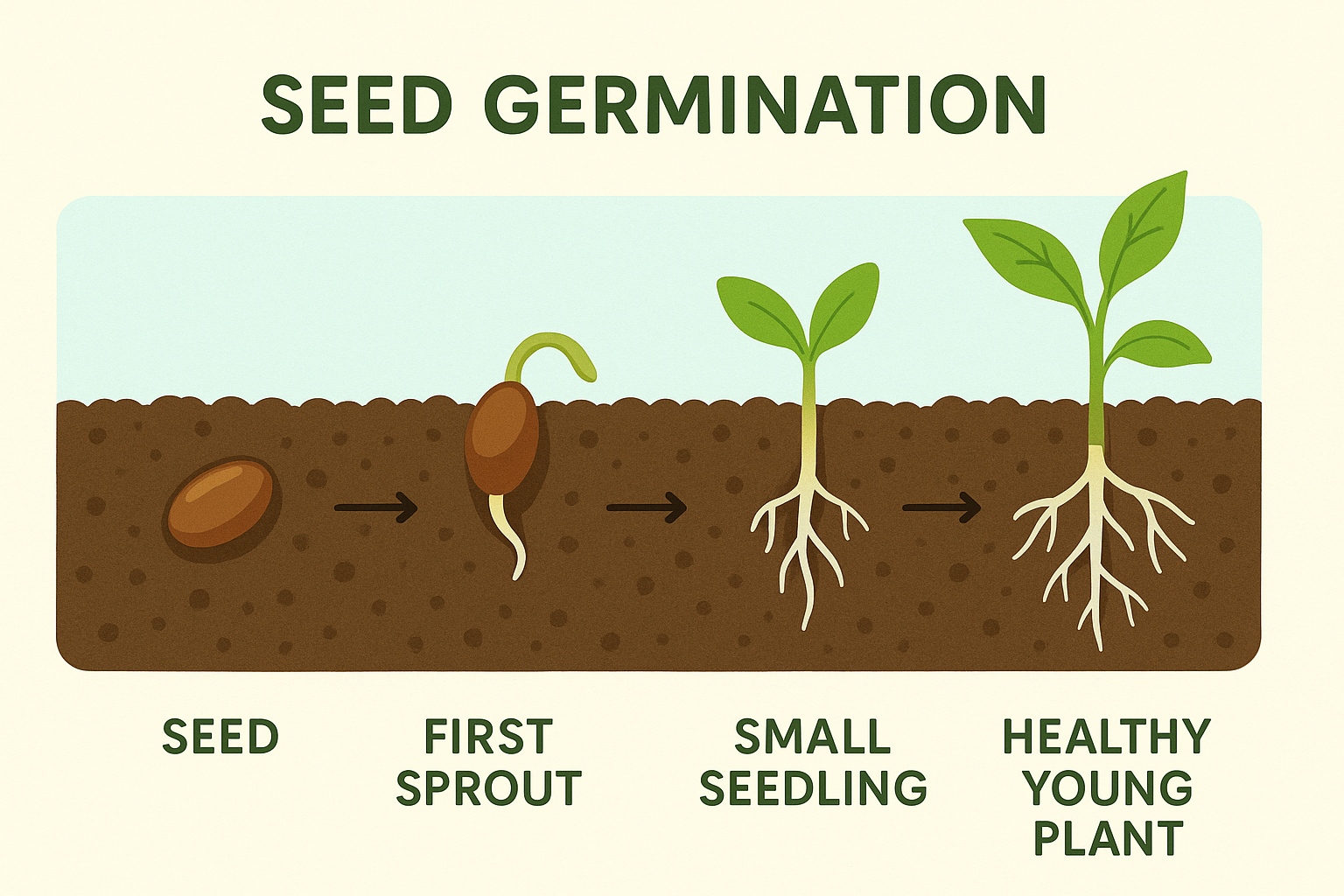
Learning proper seed starting techniques provides a structured, calming activity that promotes mindfulness and reduces anxiety.
For those new to using gardening as an anxiety management tool, starting with simple, low-stakes activities such as herb gardening or container planting can provide immediate benefits while building confidence. Harvard Health Publishing emphasizes that the key is to approach gardening with curiosity rather than pressure, allowing the natural rhythms of plant growth to teach patience and acceptance—qualities that directly support anxiety recovery.
4. Improved Self-Esteem and Sense of Accomplishment
Gardening provides a unique pathway to building self-esteem through tangible, observable achievements that accumulate over time. Unlike many modern activities that provide abstract or delayed gratification, gardening offers immediate feedback and visible progress that reinforces feelings of competence and personal efficacy. Each successful germination, healthy plant, and productive harvest serves as concrete evidence of one’s ability to nurture life and create positive change, building a foundation of self-confidence that extends beyond the garden.
The process of learning gardening skills naturally builds self-esteem through mastery experiences. As individuals develop expertise in soil preparation, plant selection, and garden maintenance, they experience the psychological benefits of skill acquisition and competence development. This learning process is particularly valuable for individuals recovering from depression or trauma, as it provides opportunities to experience success and personal growth in a supportive, non-judgmental environment.
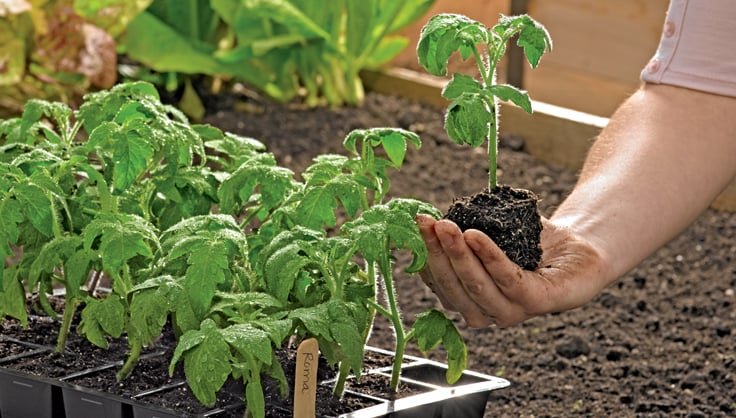
Understanding seed germination processes builds gardening confidence and provides a sense of mastery over natural processes.
The responsibility of caring for living plants also fosters a sense of purpose and importance that directly counters feelings of worthlessness or inadequacy. Plants depend on their caretakers for survival and growth, creating a meaningful relationship that validates the gardener’s value and contribution. This sense of being needed and capable of providing care can be particularly healing for individuals struggling with self-worth issues.
For those interested in creating a garden space that maximizes self-esteem benefits, consider exploring our comprehensive guide on backyard garden layout to design a space that supports both plant growth and personal development. A well-planned garden provides multiple opportunities for success and achievement throughout the growing season.
5. Enhanced Cognitive Function and Mental Clarity
Regular gardening activities provide significant cognitive benefits that extend far beyond the garden itself, improving memory, attention span, and executive function in ways that support overall mental health and daily functioning. The complex planning and problem-solving required for successful gardening engages multiple cognitive systems simultaneously, creating a form of mental exercise that strengthens neural pathways and promotes brain health.

Proper soil preparation techniques can be learned and shared within gardening communities, fostering knowledge exchange and social bonds.
The multi-sensory nature of gardening provides rich cognitive stimulation that supports neuroplasticity—the brain’s ability to form new neural connections throughout life. Gardening activities engage visual, tactile, olfactory, and proprioceptive senses simultaneously, creating complex neural activation patterns that promote cognitive flexibility and mental agility. This multi-sensory engagement is particularly beneficial for older adults, as it helps maintain cognitive function and may reduce the risk of age-related cognitive decline.
Research conducted at the University of California found that individuals who engaged in regular gardening activities showed improved performance on cognitive tests measuring attention, memory, and executive function. The study participants demonstrated better ability to focus on tasks, improved working memory capacity, and enhanced problem-solving skills compared to control groups. These cognitive benefits appeared to be cumulative, with longer-term gardeners showing greater improvements than those new to the practice.
The planning and organizational skills required for garden management also provide excellent cognitive exercise. Successful gardening requires individuals to consider multiple variables simultaneously—soil conditions, weather patterns, plant compatibility, seasonal timing, and resource allocation—creating complex mental challenges that strengthen cognitive abilities. This type of real-world problem-solving provides more meaningful cognitive exercise than abstract mental tasks, as it connects cognitive effort to tangible, rewarding outcomes.
6. Social Connection and Community Building
Gardening naturally fosters social connections and community relationships that provide crucial support for mental health and emotional wellbeing. Community gardens, gardening clubs, and shared growing spaces create opportunities for meaningful social interaction centered around common interests and shared goals. These connections often develop into lasting friendships and support networks that extend far beyond gardening activities.
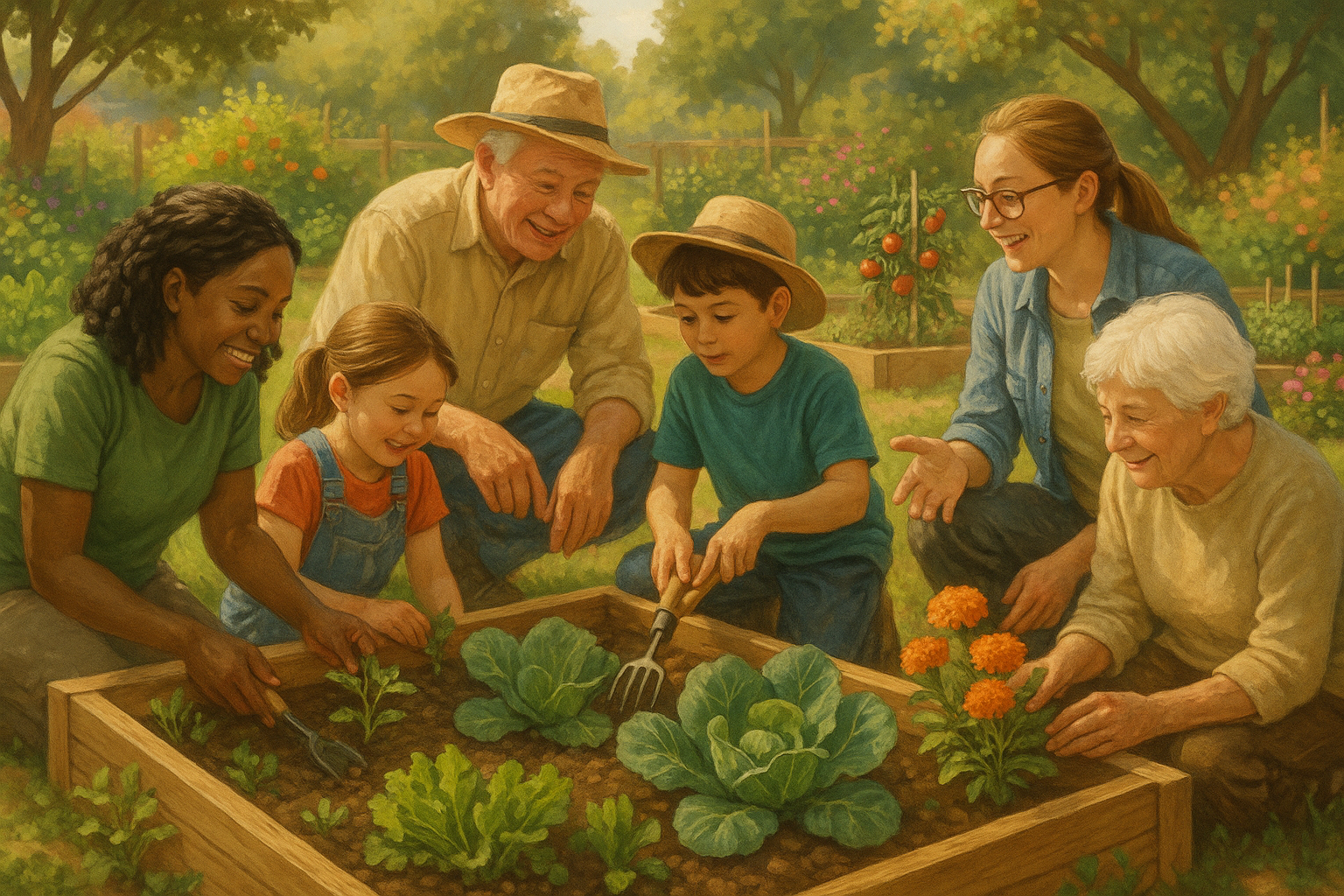
Community gardening brings together people of all ages, fostering intergenerational learning and social connection through shared garden activities.
The collaborative nature of many gardening projects promotes prosocial behavior and empathy development. Working together to plan, plant, and maintain shared garden spaces requires communication, cooperation, and mutual support—skills that strengthen social bonds and improve interpersonal relationships. The American Horticultural Therapy Association recognizes these collaborative experiences as particularly valuable for individuals who struggle with social anxiety or have difficulty forming connections in traditional social settings.
Gardening also provides natural opportunities for intergenerational connection, as experienced gardeners often enjoy sharing knowledge with newcomers. This mentorship dynamic creates meaningful relationships that benefit both parties—experienced gardeners gain a sense of purpose and value through teaching, while new gardeners receive support and encouragement that enhances their success and enjoyment. These relationships often develop into lasting friendships that provide ongoing social support.
The sharing of garden produce creates additional opportunities for social connection and community building. Exchanging surplus vegetables, sharing seeds, and gifting flowers naturally creates reciprocal relationships that strengthen community bonds. These exchanges often lead to conversations about cooking, nutrition, and family traditions, deepening social connections through shared experiences and cultural exchange.
For those interested in creating peaceful outdoor spaces that encourage social interaction, our guide on soothing ambiance of outdoor gardens provides valuable insights into designing spaces that promote both personal wellbeing and community connection.
7. Physical Exercise and Embodied Wellness
Gardening provides an ideal form of moderate physical exercise that supports mental health through the well-established connection between physical activity and psychological wellbeing. Unlike gym-based exercise routines that some individuals find intimidating or monotonous, gardening offers purposeful physical activity that feels productive and enjoyable while delivering significant health benefits. The varied movements involved in garden work—digging, planting, weeding, watering, and harvesting—engage multiple muscle groups and provide both cardiovascular and strength-building exercise.
Research published in the American Journal of Public Health found that gardening activities burn approximately 300-400 calories per hour, comparable to moderate-intensity exercises such as walking or cycling. However, unlike traditional exercise routines, gardening provides the additional psychological benefits of purposeful activity and tangible outcomes, making it more likely that individuals will maintain consistent participation over time.
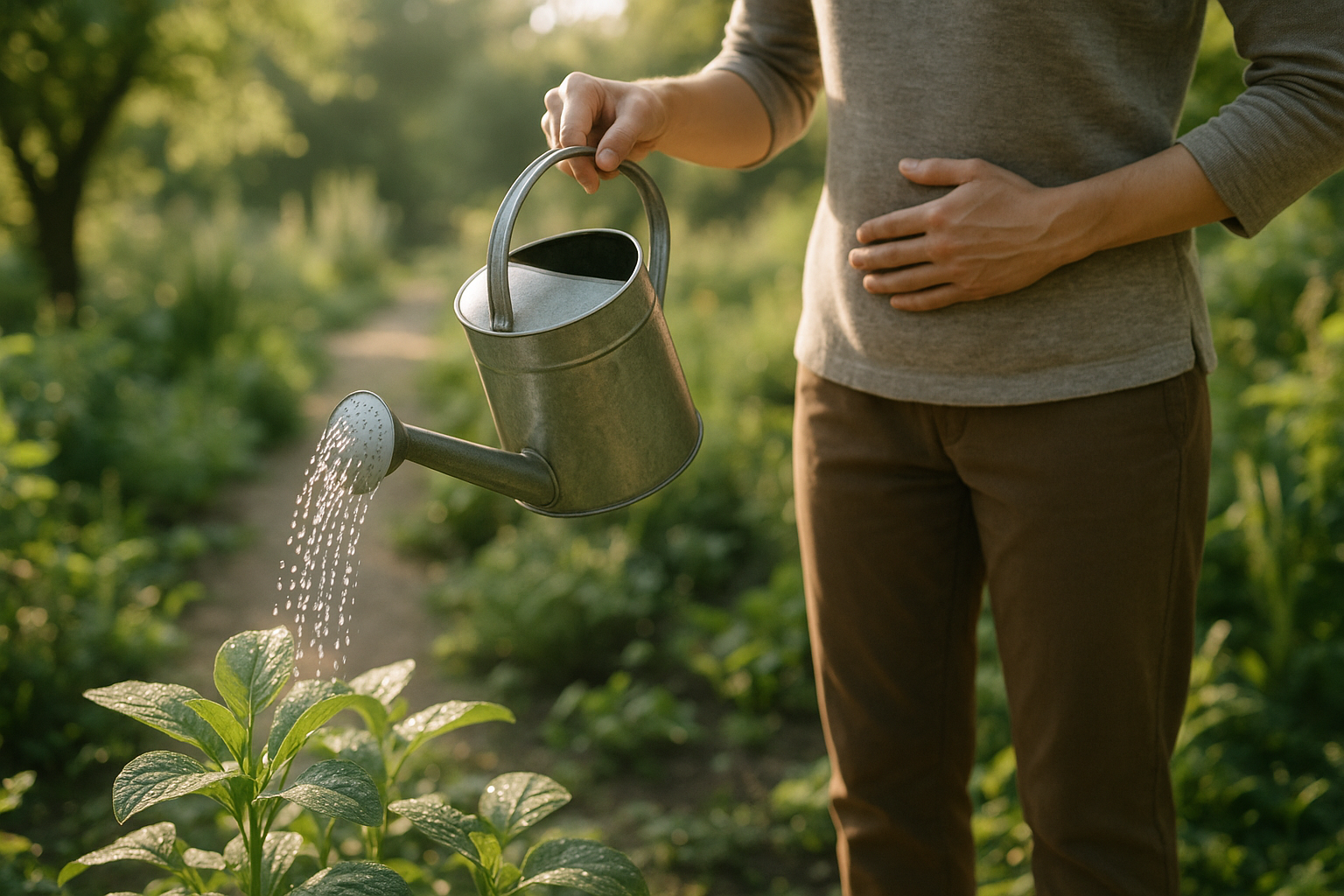
Mindful watering demonstrates the meditative quality of garden care, promoting present-moment awareness and stress reduction..
The embodied nature of garden work also promotes body awareness and mindful movement that can be particularly beneficial for individuals recovering from trauma or struggling with body image issues. The gentle, purposeful movements required for garden tasks help individuals reconnect with their physical selves in a positive, non-judgmental context. This embodied awareness often translates into improved self-care practices and a more positive relationship with physical activity in general.
8. Seasonal Awareness and Natural Rhythm Alignment
Gardening naturally attunes individuals to seasonal cycles and natural rhythms that promote psychological stability and emotional regulation. In our increasingly artificial environments, many people lose connection with the natural cycles that have regulated human behavior and wellbeing for millennia. Gardening reestablishes this connection, providing a framework for understanding and accepting the natural ebb and flow of energy, growth, and rest that characterizes healthy psychological functioning.
The seasonal nature of gardening teaches valuable lessons about patience, acceptance, and the natural timing of growth and change. These lessons often translate into improved emotional regulation and a more balanced approach to personal goals and expectations. Understanding that growth requires periods of dormancy and that setbacks are natural parts of the cycle can help individuals develop more realistic and compassionate relationships with their own healing and development processes.
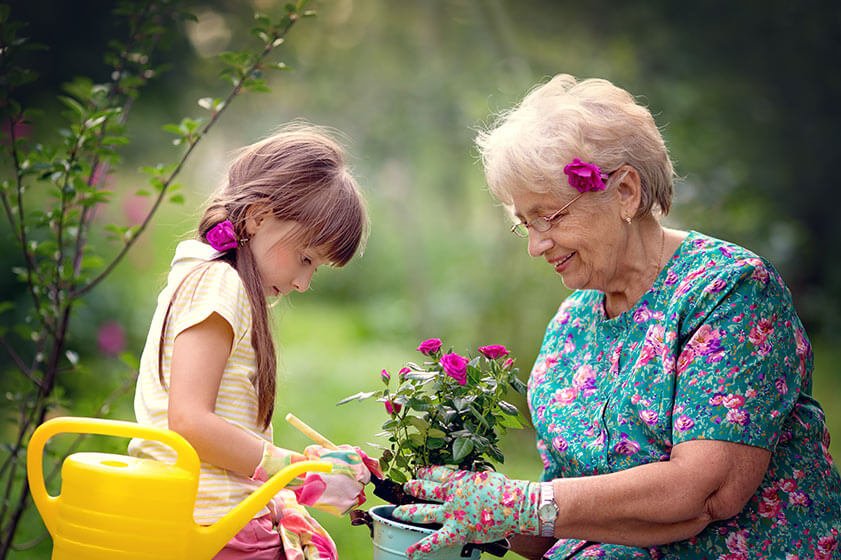
Gardening provides particular mental health benefits for elderly individuals, promoting cognitive function and social engagement.
Seasonal gardening activities also provide structure and anticipation that support mental health throughout the year. Planning spring gardens during winter months, preparing soil in early spring, tending growing plants through summer, and harvesting in fall create a natural calendar of meaningful activities that provide purpose and forward-looking perspective. This seasonal structure can be particularly beneficial for individuals struggling with depression or seasonal affective disorder.
For those interested in creating gardens that maximize seasonal benefits, exploring mind healing fall foliage escapes can provide inspiration for designing spaces that support mental wellness throughout the changing seasons.
9. Mindfulness and Present-Moment Awareness
Gardening naturally cultivates mindfulness and present-moment awareness through its inherent demands for attention and sensory engagement. The focused observation required to assess plant health, soil conditions, and garden needs creates a natural meditation practice that anchors awareness in the immediate environment. This mindful engagement provides a healthy alternative to the rumination and worry that characterize many mental health challenges.
The sensory richness of garden environments supports mindfulness practice by providing multiple anchors for present-moment awareness. The texture of soil, the scent of flowers, the sound of rustling leaves, and the visual beauty of growing plants create a multi-sensory experience that naturally draws attention away from anxious thoughts and into immediate sensory experience. This sensory grounding is particularly valuable for individuals who struggle with traditional meditation practices.
The slow, deliberate pace required for many gardening tasks naturally promotes mindful awareness and reduces the rushed, scattered attention patterns that contribute to stress and anxiety. Activities such as transplanting seedlings, hand-weeding, or harvesting require careful attention and gentle movements that cultivate patience and presence. These qualities, developed through garden practice, often transfer to other areas of life, improving overall emotional regulation and stress management.
For individuals interested in deepening the mindfulness aspects of their garden practice, creating a dedicated meditation garden for inner peace and relaxation can provide a structured approach to combining gardening with formal mindfulness practice.
10. Connection to Life Cycles and Existential Meaning
Gardening provides profound opportunities for connecting with fundamental life processes and developing a deeper understanding of growth, change, and renewal that can transform one’s relationship with personal challenges and life transitions. Witnessing the complete cycles of plant life—from seed to maturity to death and renewal—offers powerful metaphors for understanding human experience and finding meaning in both struggle and growth.
The direct observation of natural resilience in garden settings can be particularly healing for individuals facing difficult life circumstances. Watching plants recover from damage, adapt to challenging conditions, and continue growing despite setbacks provides tangible examples of resilience and renewal that can inspire hope and perseverance in human contexts. These observations often lead to profound shifts in perspective about personal challenges and the possibility for recovery and growth.
The cyclical nature of garden life also provides comfort and perspective during times of loss or transition. Understanding that endings are natural parts of life cycles, and that they create space for new growth and possibilities, can help individuals process grief and navigate major life changes with greater acceptance and hope. The garden becomes a living teacher about the natural rhythms of life, death, and renewal that characterize all existence.
Gardening also connects individuals to the larger web of life and ecological relationships that can provide a sense of belonging and purpose beyond individual concerns. Understanding one’s role in supporting pollinators, building soil health, and contributing to local ecosystems creates a sense of meaningful participation in something larger than oneself. This ecological awareness often leads to increased environmental consciousness and a sense of responsibility that provides purpose and direction.
Creating Your Therapeutic Garden: Practical Implementation Strategies
Establishing a therapeutic garden requires thoughtful planning that prioritizes mental health benefits alongside practical growing considerations. The most effective therapeutic gardens are designed with accessibility, sensory engagement, and personal meaning in mind, creating spaces that invite regular interaction and provide multiple opportunities for healing and growth.
Begin by assessing your available space and resources, remembering that therapeutic benefits can be achieved in containers, small plots, or even indoor growing spaces. The key is to create a garden that feels manageable and inviting rather than overwhelming or burdensome. Start small and expand gradually as your skills and confidence develop, allowing the garden to grow alongside your therapeutic practice.
Consider incorporating elements that specifically support mental health goals. Calming garden features such as water elements, comfortable seating areas, and fragrant plants can enhance the therapeutic potential of your space. Choose plants that engage multiple senses and provide year-round interest, ensuring that your garden offers benefits throughout all seasons.
For those interested in combining gardening with culinary therapy, exploring garden-to-table recipes can add another dimension to the therapeutic benefits of your garden practice. Growing and preparing your own food creates additional opportunities for mindfulness, creativity, and nourishment that support overall wellbeing.
Conclusion: Cultivating Mental Wellness Through Garden Practice
The scientific evidence supporting gardening as a therapeutic intervention continues to grow, validating what many practitioners have long understood intuitively—that working with soil and plants provides profound benefits for mental health and emotional wellbeing. The ten benefits explored in this article represent just the beginning of gardening’s therapeutic potential, as researchers continue to discover new ways that garden practice supports psychological healing and personal growth.
The beauty of gardening as a mental health intervention lies in its accessibility and sustainability. Unlike many therapeutic approaches that require ongoing professional support or expensive resources, gardening provides a self-directed pathway to wellness that becomes more rewarding and beneficial over time. The skills, knowledge, and relationships developed through garden practice create lasting resources for mental health maintenance and personal growth.
As we face increasing rates of anxiety, depression, and stress-related disorders in our modern society, gardening offers a time-tested, scientifically-supported approach to mental wellness that addresses both symptoms and underlying causes. By reconnecting with natural processes and engaging in meaningful, purposeful activity, individuals can develop the resilience, perspective, and coping skills necessary for long-term mental health and life satisfaction.
Whether you’re dealing with specific mental health challenges or simply seeking to enhance your overall wellbeing, gardening provides a gentle, effective pathway to healing that honors both human needs and natural wisdom. Start where you are, with what you have, and allow the garden to teach you about growth, resilience, and the profound healing power of connecting with the earth.
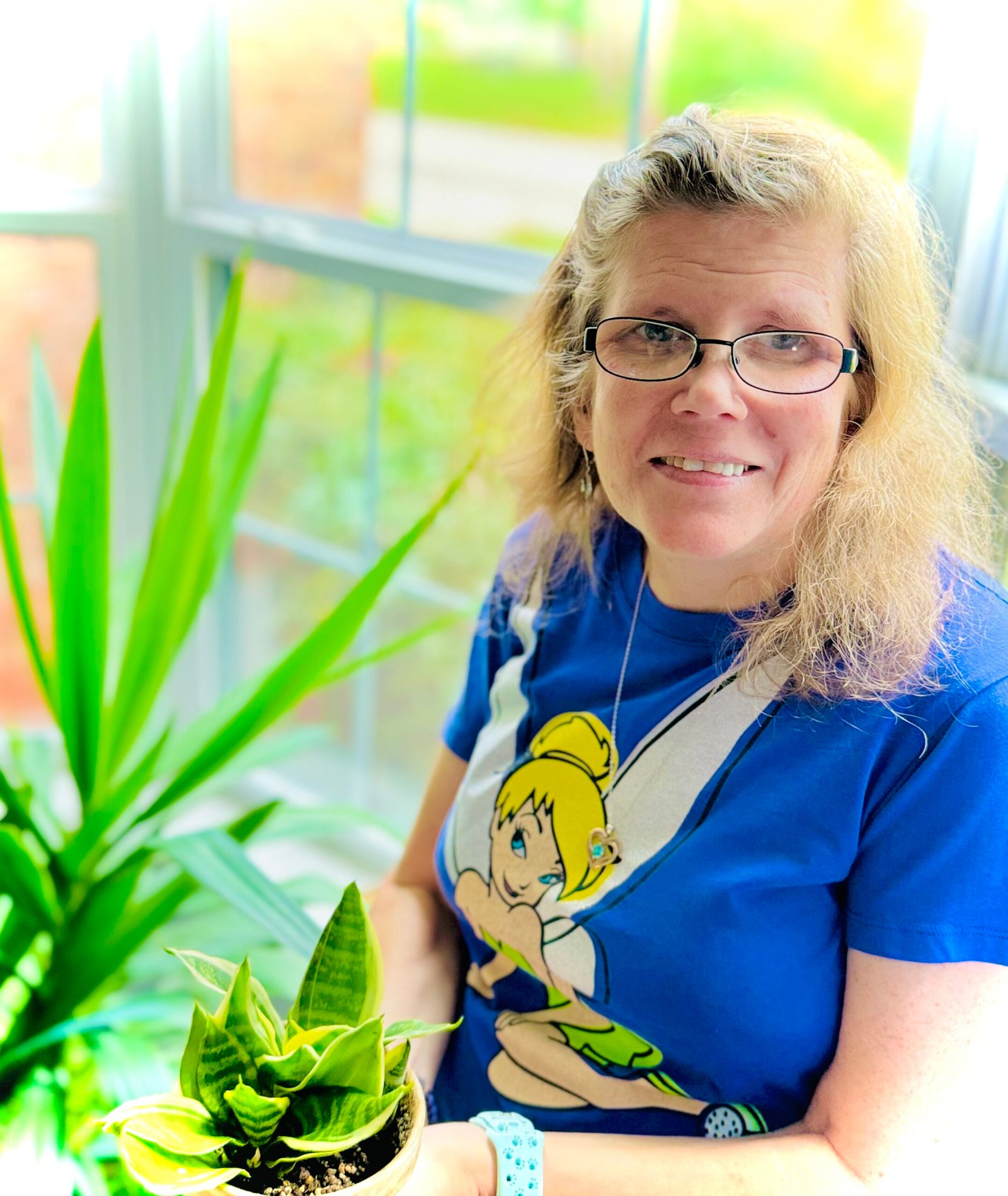
My name is Michelle Warren, and I’m the founder of Peaceful Gardening. As a 10-year breast cancer survivor, I’ve discovered the profound therapeutic power of gardening. This journey has not only helped me recover but has also become my passion and a source of ongoing peace and joy.
Peaceful Gardening was born from my desire to share the healing benefits of gardening with others. Whether you’re facing health challenges, dealing with stress, or simply looking to connect more deeply with nature, this space is for you.
Over the past decade, I’ve cultivated not just plants, but a deep understanding of how gardening can positively impact mental health. I’ve worked with local community gardens, led workshops on mindful gardening practices, and collaborated with mental health professionals to develop gardening-based stress reduction programs.
Peaceful Gardening was born from my desire to share the healing benefits of gardening with others. Whether you’re facing health challenges, dealing with stress, or simply looking to connect more deeply with nature, this space is for you.
Here, you’ll find evidence-based advice on using gardening as a tool for mindfulness, stress relief, and emotional healing. I share personal stories, practical tips, and scientifically-backed information on how to create your own therapeutic garden space, no matter the size of your yard or balcony.
My mission is to help you discover the joy, peace, and healing that comes from nurturing plants and connecting with nature. Join me in exploring how the simple act of tending to a garden can transform your mental and emotional wellbeing.
Welcome to Peaceful Gardening – let’s grow together towards better mental health!”

